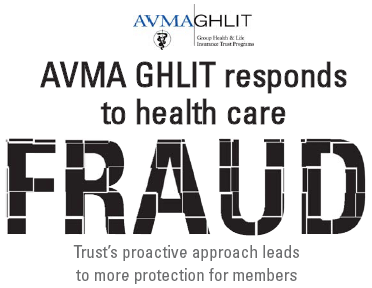AVMA GHLIT responds to health care fraud
|
Ten members of the AVMA Group Health & Life Insurance Trust recently fell prey to health care fraud. In each situation, a member's personal information was obtained at random and used to submit fraudulent claims under a false provider. Through certain security measures, the Trust was able to identify the false claims before any payment was administered.  Fraudulent claims have become a growing concern in the health care industry. An estimated 10 percent of all claims processed in the United States involve some fraud, making it a multibillion-dollar problem, the GHLIT reported. The 10 cases at the Trust accounted for roughly $44,000 worth of fraudulent claims during June and July. Since 2002, the GHLIT medical claims administrator, Harrington Benefits, has saved the GHLIT more than $370,000 in related savings. Harrington, based in Westerville, Ohio, detected the 10 cases through its Special Claim Services Department in Dayton, Ohio. The department works with the claims department to identify and investigate potentially fraudulent claims. As a subsidiary of Fiserv Health Inc., Harrington receives alerts from the National Health Care Anti-Fraud Association on potentially fraudulent situations and providers. It also works with the department of insurance in several states where the most fraudulent health care claims occur, and receives alerts from the Federal Bureau of Investigation and the state attorneys general. After the GHLIT determined the claims involving the 10 members were fraudulent, Harrington sent a letter to each one, notifying them of the situation and that it appeared that an unknown third party had stolen their personal information. After the letters were sent, Harrington followed up within 10 working days to confirm the members had received the letter and to answer any questions they might have, even though the letter included a phone number for more information. The 10 members at GHLIT were not necessarily victims of identity theft, though some of their personal information was stolen, said Gregg Buis, director of the Corporate Audit Department at Harrington. There was no indication that the members' Social Security numbers or any other information that would compromise their identities was stolen. Similar to identity theft, however, fraudulent health care claims in general are submitted by people trying to obtain information and make money wherever possible—illegally. "One of the scams that especially affects health care ... is where people obtain personal information, whether it be (health care) certificate numbers, addresses, or whatever of insureds, and they attempt to submit phony claims under these people and seek payment," Buis said. This type of claims fraud surfaces every two to three years. "What they do, they hit and run. They'll try to submit a claim under somebody and then they try never to use the same person over, at least not in the same year," Buis said, because the longer they use the same information, the more chance they're going to get caught. For example, one of the 10 individuals whose information was stolen and then used to submit a false claim is a former GHLIT member and has not had health care coverage through the Trust since 2002. "Typically, these scams are based offshore," Buis said. For instance, a fraudulent provider might submit claims and then direct the payments to a post office box. From there, Buis said, the payments might be sent offshore to where the checks are cashed. To help prevent a payout for a fraudulent claim, Harrington provides ongoing health care fraud training for its examiners on how to notice typical signs. "Once we receive any type of notification, or through our own investigations determine any type of scam is going on, we take a very proactive approach," Buis said. "We go ahead and get everything set up in the system so if any of these bogus providers try to hit us, (we're) going to have them flagged. We set it up so no payments can be released to them." In addition, the health care provider maintenance area at Harrington verifies all providers' information before uploading the information into the company's system. GHLIT members can take certain steps to avoid falling prey to health care fraud. First, the Trust recommends that members examine statements from health care providers. If the member receives an Explanation of Benefits statement for a service they did not request or receive, the member should contact the GHLIT immediately by phone at (800) 621-6360. The GHLIT also recommends that members shred documents containing personal information before disposing of them. All personal information should be secured at home and at the office. Finally, outgoing mail with personal information included should be handed directly to a mail carrier or deposited at the post office in a secure post box, not left in an unsecured mailbox. | ||